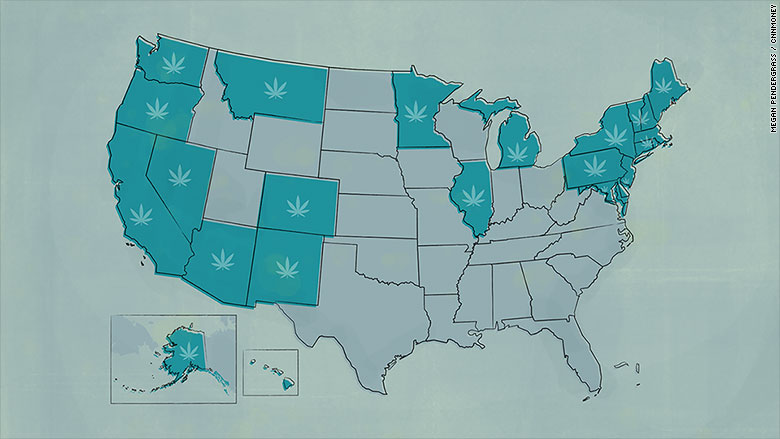 Growing Number of Baby Boomers Are Using Marijuana
0
Growing Number of Baby Boomers Are Using Marijuana
0
BY
GUEST POST ON APRIL 25TH, 2017 AT 1:01 PM | UPDATED: APRIL 25TH, 2017 AT 1:06 PM
LIFESTYLE,
MARIJUANA NEWS
declining, a 2012 Statistics Canada community health survey found that the percentage of older users has
quadrupled since 2002. The increase in the U.S. is just as dramatic. A 2016 study published in the journal
Addiction indicates that marijuana use among those 65 and up swelled by 250 per cent between 2006 and 2013.
These days, Susan smokes pot using a vaporizer, a move advised by her doctor. She makes her own edibles mixing oil with vaporized weed, adding it to peanut butter and homemade granola.
“When I travel, I bring the granola,” she says.
Asked if she’s ever worried about getting caught crossing the border, Susan shrugs. “I’m just a Jewish grandmother from Toronto.”
When NOW went searching for older women who use cannabis, they were hard to find at first. But where there’s smoke, there are stoners. Many of the women we contacted have smoked pot for years and continue to be huge fans of the stuff. A few of them have grown their own, one was a small-time dealer, and nearly all of them had concocted their own edibles, topical creams and more.
Take Joan, a retiree who’s been smoking pot for 50 years and tends a several-hectare garden in Peel where she grows a dozen or so marijuana plants.
“We have our own animals and manure, so it’s all organic,” Joan states proudly. “My friends started wanting some of it because it’s better than that hydroponic stuff. I give most of it away, but I sell a little bit here and there.”
She recently got into edibles, which she enjoys socially. “I make a lot of cookies and butters,” she says. Many of her friends are stoners who drop by for some conversation over a bottle of wine and Joan’s pot cookies. More often than not, Joan smokes a joint during the day to help her work her garden.
“Pot gets me motivated. I can work for, like, six or seven hours after smoking. It’s amazing,” she says.
Joan also makes her own cannabis cream, which she says helps relieve joint pain and muscle aches. She’s been trying to convince her 86-year-old mother to give it a try instead of popping Tylenol.
Many of the women we spoke with claim smoking pot and consuming marijuana-laced edibles help with medical issues, even though none of them are licensed medpot users.
Craig Jones, executive director of NORML Canada (National Organization for the Reform of Marijuana Laws), says he’s heard countless similar stories from older users, particularly menopausal and post-menopausal women, on pot’s medicinal benefits.
Cannabis is believed to help relieve symptoms like mood swings, fluctuations in body temperature, sleep irregularities and pain.
Jones says, “I have one female friend who’s a trauma survivor, and she says the only decent sleep she gets is under the influence of cannabis.”
Growing interest in cannabis has led some businesses to target the demographic specifically. Collingwood-based CanCann Consulting hosts monthly workshops on how to use pot to help with pain. Events held at holistic community hubs are often standing-room-only, packed with folks eager to learn recipes for cannabis edibles, oils and tinctures.
Evelyn obtains her weed from her partner, who has a medpot licence. Once a week, he turns part of his bounty into oil, which she bakes into brownies for sleep and pain relief.
“My doctor says she believes it’s a safe alternative to sleeping pills,” she says.
Ida also self-medicates, although her doctor doesn’t know about it. The 61-year-old Barrie woman started smoking pot as a teenager. She’d use her weekly allowance to buy a nickel bag, which would last her the weekend. By the time she was in her 20s, she needed pot to help calm her down and sleep.
“I’m kind of a hyper person, so it keeps me on the same level as most people,” she says. “It’s part recreational and part self-prescribed medicinal, if you want to call it that.”
Living in west Toronto, Ida worked several jobs, including 12 years as a student loan clerk, before moving to Barrie.
“Sometimes I wake and bake if I don’t feel like doing anything,” she says. “Usually I have three joints a day.”
While Ida also smokes between five and 10 tobacco cigarettes daily, most of the women we spoke to smoke pot exclusively. Though a few had experimented with other recreational drugs in their youth, many rarely consumed alcohol.
Deb, who lives in Toronto’s east end, was an intravenous drug user addicted to speed as a teenager in the 1960s. Even when she became pregnant at 17 and then again at 20, she found it hard to quit drugs. When she took up smoking pot, her family was relieved.








